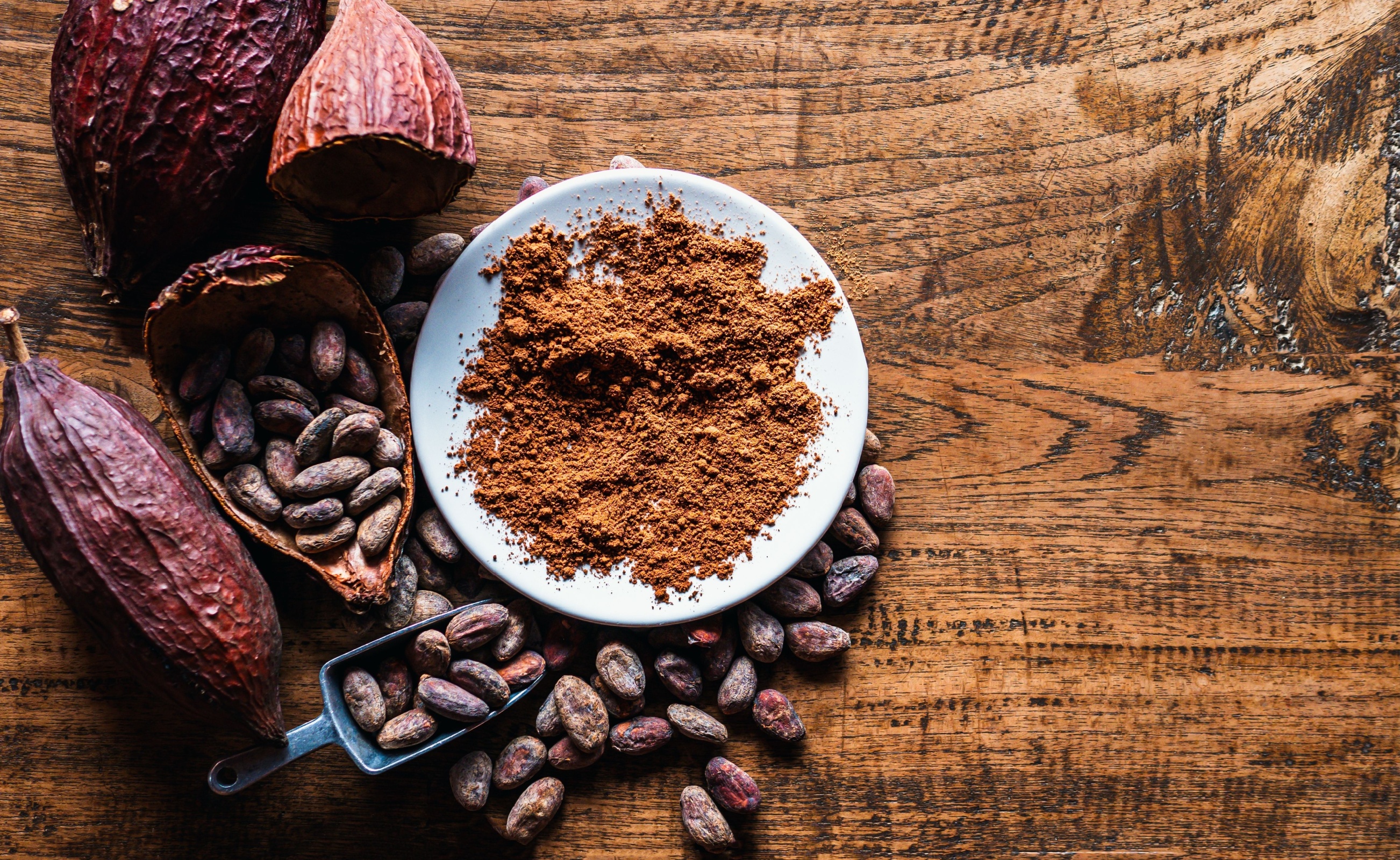Science is finding more reasons to love curling up with a hot cup of cocoa or indulging in a bar of dark chocolate. Cocoa’s benefits go far beyond delighting our taste buds.
A recent study found that unprocessed cocoa protected the vascular system against stress—even after the consumption of fatty foods.
Cocoa for Heart Health
Cocoa has been shown to improve cardiovascular health. Cocoa’s flavonoid content helps lower blood pressure, increase blood flow, and enhance the function of blood vessels, thereby reducing the risk of heart disease.
In a recent study published in Food & Function, a research team from the University of Birmingham investigated whether eating foods containing flavanols from cocoa could mitigate vascular damage caused by fatty meals during stressful episodes.
Researchers found that cocoa high in flavanols helped reduce vessel damage during mental stress compared with cocoa with low flavanol content. Specifically, cocoa rich in flavanols improved vessel function 90 minutes after a stressful event and reduced stress-induced decline of endothelial function (which controls blood flow) at 30 minutes, compared with its low-flavanol counterpart.
The study builds on previous research by the same team, which found that eating high-fat foods can worsen the health of our blood vessels during stressful moments compared with foods that are low in fat. This is significant because people generally gravitate to fatty comfort foods such as chips, baked goods, and other junk foods when stressed.
“Flavanols take up to one hour to reach circulation and reach their maximum benefits at two hours post-intake, so having a food/drink rich in flavanols at least one hour prior to the stress event, would be ideal,” Catarina Rendeiro, assistant professor in nutritional sciences at the University of Birmingham and leading author of the paper, told The Epoch Times in an email. “However, if a person regularly consumes foods rich in flavanols (e.g., every three to four hours), they would be experiencing the benefit of these compounds most of the time, meaning that they could be protected whenever mental stress happens to hit.”
Fighting Disease From the Inside Out
Cocoa is rich in polyphenols—compounds found in plants that help protect them from diseases. Those protective characteristics are passed on to us when we eat foods high in polyphenols. Polyphenols give plants and foods such as fruit and vegetables their color. The deeper and brighter the colors, the higher the polyphenol content, which is why we are often told to “eat the rainbow.”
Polyphenols have antioxidant properties, fight inflammation, and protect against free radical cell damage leading to oxidative stress, which is considered the root of many of the most destructive chronic illnesses, such as heart disease and cancer.
Foods such as vegetables, fruits, nuts, seeds, whole grains, berries, ginkgo biloba, black and green tea, and cocoa are excellent sources of beneficial polyphenols.
Courtney Pelitera, a registered dietitian with Top Nutrition Coaching, told The Epoch Times that polyphenols in cocoa contain flavonoids, which have numerous health benefits. These include improved blood circulation, enhanced blood pressure regulation, reduced cardiovascular disease risk, and improved insulin sensitivity, which is advantageous for individuals with diabetes.
“Additionally, cocoa also contains magnesium, potassium, copper, and calcium,” she noted. “All important minerals for healthy blood flow.”
However, not all cocoa-containing products have the same amount of polyphenols. Processing cocoa can significantly decrease its polyphenol content, so try to find products that are minimally processed or as close to the raw bean as possible.
Although the terms “cocoa” and “cacao” are often used interchangeably, they differ. Cacao refers to the raw or unprocessed beans from the Theobroma cacao tree, while cocoa refers to the processed form found in chocolate bars and cocoa powder.
Cognitive Benefits
The flavanols in cocoa are known to have many beneficial effects on the brain. Multiple
studies have shown that flavanols positively affect several processes related to cognition, such as processing speed, attention, working memory, and executive function.
Research has also found that cocoa improves memory and protects against neurodegenerative diseases such as Alzheimer’s by improving blood flow to the brain and increasing levels of brain-derived neurotrophic factor, a protein that protects against neurodegeneration.
In a 2020 review, scientists analyzed 11 studies involving 366 participants, predominantly under 25, to examine cocoa’s potential to sharpen young minds. The collective research painted a compelling picture: Cocoa isn’t just a treat but also a cognitive enhancer that can boost brain performance both in the short term and over time.
Specifically, the researchers found that short-term cocoa consumption increased blood flow and oxygen levels in the brain, and consuming cocoa’s beneficial flavanols over the long term led to better cognitive performance and increased levels of neurotrophins, proteins that support the brain’s ability to make new connections.
Improvements in Mood
Cocoa, in the form of dark chocolate, is known to improve our mood when we’re feeling down.
In a randomized controlled trial published in 2022, researchers examined how eating dark chocolate affects mood and whether the effects are linked to the gut-brain axis in a group of healthy adults. Participants were randomly assigned to one of three groups: a 70 percent cocoa dark chocolate group, an 85 percent cocoa dark chocolate group, and a control group. Participants in the chocolate groups consumed 30 grams of dark chocolate daily.
Results showed that eating 85 percent cocoa dark chocolate significantly reduced negative emotions compared with the control group. However, the group eating 70 percent cocoa did not experience the same mood improvements, suggesting that higher cocoa content may be more effective for enhancing mood.
Additionally, gut microbiota analysis showed increased diversity in the group eating 85 percent cocoa dark chocolate, particularly an increase in Blautia obeum, a bacterium linked to mood modulation through the production of butyrate, which prevents leaky gut and has been shown to exert antidepressant-like effects and “reverse depressive behaviors” in rats.
In simpler terms, eating 85 percent cocoa dark chocolate may help elevate our mood by improving the diversity of beneficial bacteria in our gut.
Insulin Sensitivity
Cocoa may also improve insulin sensitivity and contribute to better blood sugar management.
A 2021 study of healthy adults found that eating cacao polyphenol-rich chocolate before a glucose challenge boosted glucose and GLP-1 secretion. GLP-1 is a hormone that helps control blood sugar by stimulating the release of insulin and improving insulin sensitivity. The study also found that eating polyphenol-rich chocolate helped lower blood sugar levels right after a meal.
The findings suggest cacao polyphenol-rich chocolate could help people with diabetes maintain lower and more stable blood sugar levels post-meal by increasing insulin and GLP-1.
Things to Consider
When introducing cocoa into your diet, several factors are important to consider.
The first is that processing affects cocoa’s nutritional content.
“Processing cocoa, such as in a chocolate bar, essentially can dilute the polyphenol content in the chocolate by up to 90 percent,” Pelitera said. “This is going to vary greatly depending on the quality of the chocolate, the percentage of cocoa, and the manufacturing process.” Dark chocolate with a higher cocoa percentage offers more antioxidants and polyphenols, but it tends to taste more bitter than milk chocolate, she added.
For optimal health benefits, Pelitera suggested treating cocoa as a supplement. Adding cocoa powder to yogurt, oatmeal, smoothies, and baked goods provides the benefits and flavor without undesirable fillers. “Use this in a vanilla yogurt or something that already has a little bit of sweetness to help with the bitter taste,” she said. She recommended selecting dark chocolate bars with at least 70 percent cocoa.
Potential Drawbacks
Despite its benefits, there are potential downsides to increasing cocoa consumption. Many chocolate bars in the grocery store don’t contain enough cocoa to have health benefits and are often high in added sugars, fats, and other unwanted ingredients. “It is recommended to limit added sugar intake to 50 grams per day for the average adult,” Pelitera said. Fifty grams of sugar is about 4 tablespoons and is equivalent to eating approximately two pieces of a commercially prepared chocolate cake with chocolate frosting.
Cocoa contains caffeine and theobromine, both of which are stimulants. Although cocoa has lower caffeine levels compared with tea or coffee, people sensitive to caffeine should monitor their cocoa intake, particularly before bedtime.
Cocoa also contains oxalates, which can cause kidney stones in susceptible people. Therefore, those prone to kidney stones should talk to their doctor about limiting their cocoa consumption.
Concerns about heavy metals such as lead and cadmium in cocoa products are also warranted. A recent study found heavy metals in popular chocolate products, with even higher levels in products labeled organic. This is caused by the cacao plant’s ability to absorb heavy metals from the soil, so you may want to find brands that regularly test for heavy metals and diversify the types of cocoa products you eat to avoid potential toxicity.
Final Thoughts
Most of us already have plenty of reasons to enjoy cocoa, especially since it’s the key ingredient in chocolate—a food many love. However, moderation is essential to maximize its health benefits and minimize associated risks.
While the research isn’t definitive on how much cocoa we need to eat to reap its benefits, it suggests 40 to 50 grams daily of cocoa powder or dark chocolate is a good place to start, Pelitera said.
Cocoa is also incredibly versatile. It makes a healthy (and yummy) addition to almost anything—from your coffee to a nearly endless list of scrumptious desserts. Historical and scientific evidence supports cocoa’s role in improving our health while making life a little more delicious.














